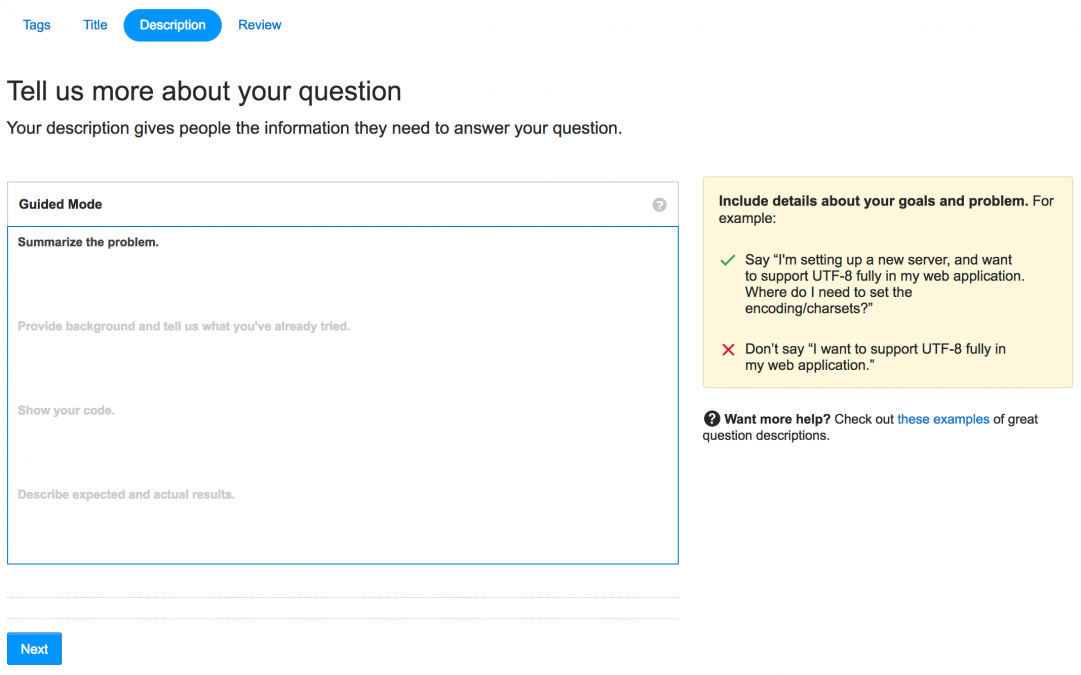Back in late Spring, we posted “Stack Overflow Isn’t Very Welcoming. It’s Time for That to Change.” We know it’s all too common for companies to announce they really want to do a thing, and then… not much happens. So, it is time to share the work we’ve been doing behind the scenes and how our team of data scientists, developers, long term community managers, and UX specialists will continue iterating on our plans for the future.
Done
Shipped the “Ask a Question Wizard” prototype

This new workflow should help new askers craft questions more successfully with less stress. Each step gathers specific input that’s generally needed to help answerers. As we test it, we can expand this design to support additional question types. We’ve already done a couple rounds of user testing and are now gathering feedback from the community. You can check it out here and leave feedback on this post.
Built an “Unwelcoming or snarky” comments classification app
Our users have always been really great at flagging and removing outright abusive comments, but we’ve long struggled to deal with (or even define clearly) lower-key unpleasantness: condescension, snark, dismissiveness. We just finished our first step to change that: 57 employees provided 13,742 ratings of “fine,” “unwelcoming or snarky,” or “abusive,” on random comments on SO, and we’ll be sharing the initial results and our next steps in a separate post.
Created a prioritized queue of 67 other next up initiatives
Some of these are already in active discussion with the community, like removing auto-downvotes that come with certain flags. The key here is that we will always have a next initiative to move forward for discussions, input, and implementation, so we won’t lose momentum.
In progress
Comment flagging improvements
We are working on various improvements to comment flagging to increase visibility and allow more people to participate in this critical activity.
Community/civility partnerships
We’ve connected to individuals (researchers, academics, community managers and data scientists) from many institutions and companies that are concerned about civility on the internet. We’ve kicked off collaborations with a couple companies to build machine learning approaches that can address civility in internet scale communities. More data can train smarter analysis, so we are optimistic about these collaborations. Machine learning isn’t a magic solution nor will it be our only avenue for partnerships, but it will be a part of our toolkit. We hope to have more to share soon.
Upgrading our community standards
We are undertaking a full review of our community standards, including an overhaul of our "Be Nice" policy to evolve it into a full fledged code of conduct, which better articulates exactly what we expect and how those expectations are enforced. Our first draft is almost done and we’ll be sharing it for feedback early next week.
Our internal framework to attack the problem
We’ve created a framework to help us ensure we’re being disciplined in how we define the problems and prioritize solutions.
Understanding exclusion
We need to fully understand the scope and depth of the problem. Using data insights and UX research we are attempting to answer questions like these:
- What are the negative experiences people have had while using Stack Overflow?
- What are the site functions that contribute to negative feelings, expectations, and/or experiences?
- What are the behaviors that contribute to negative feelings, expectations, or experiences?
Learn from others’ inclusion efforts
By engaging and working with others who are actively tackling inclusion efforts (particularly other companies dealing with internet scale communities) we want to:
- Learn, learn, learn. We aren’t the experts.
- Investigate solutions from other online communities who had to address similar issues.
Solve for one, extend to many
We believe that by focusing on excluded people we can make Stack Overflow (and the entire Stack Exchange network of Q&A sites) better for everyone. We are committed to making changes in:
- community standards
- enforcement mechanisms
- the software that runs the site.
Engage the broad community
We commit to an open dialog about our goals, understanding of the problem, ideas for research and solutions and progress on both Meta and our blog.
Next up
We will be providing regular updates on the work we are doing around inclusion. Soon, we’ll be sharing more details in separate posts on the Ask a Question Wizard, what we learned from our comment classifier, and our proposed new code of conduct. We’re on a long road here, but we’re excited about our progress so far. We hope you’ll stick with us for the rest of the ride.
